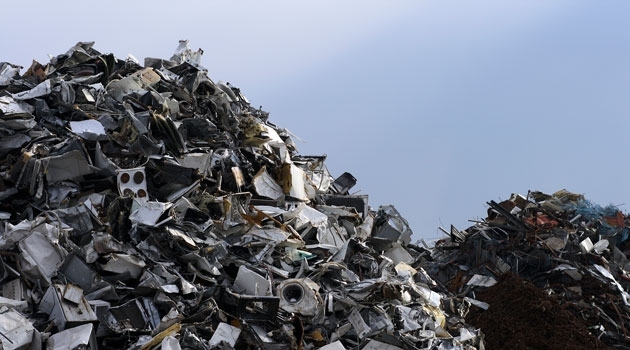“We live in the age of garbage”
In the quest for a circular economy and a sustainable society, we need to transform our waste into a resource. In the so-called waste package, the Riksdag and the Swedish Government have adopted new legislation that to a far greater extent considers waste to be a resource. The waste package is due to be introduced in 2025 and Uppsala University is currently conducting research on the subject.
The waste package is based on a package of EU legislation and has required a significant number of changes to Swedish legislation and regulations. The new rules are intended to benefit the circular economy.
Uppsala University researchers Björn Wallsten of the Department of Sociology and Per Fors of the Department of Civil and Industrial Engineering are looking at how we can become better at using our waste as a resource. Both Björn and Per are members of the interdisciplinary platform Uppsala University Sustainability Initiatives (UUSI), which strengthens the University’s research on sustainability issues.
Valuable material risks going to waste
Sociology, Uppsala University.
The new statutory requirements are not the only reason why research into waste is important.
“We live in the age of garbage. In a way, research into waste is therefore about shining a light on our societies’ own backyards, on communicating an alternative narrative to all the talk of how technologically advanced and developed our civilisation is,” says researcher Björn Wallsten.
Björn Wallsten has conducted both qualitative and qualitative research into various types of waste, including how we can recycle infrastructure and whether sewage sludge could become a resource and, if so, how.
Per Fors, a researcher at the Department of Civil and Industrial Engineering, has also researched waste, this time focusing on sustainability in information technology.
“Nobody wants to see or smell rubbish heaps but when we incinerate or bury waste we risk missing out on valuable materials as well as creating other sustainability-related problems in the process. But how do we persuade a great many different stakeholders in the IT industry to cooperate on reducing waste and extending the working life of products? This is where research is particularly important,” says Per Fors.
Interdisciplinary research is key
and Industrial Engineering, Uppsala University.
As waste is the result of many different processes – such as policy decisions, innovation, technological development and individual behaviour – multidisciplinary and interdisciplinary research is demanded in the field.
“While engineers examine the technical aspects, economists the financial implications and sociologists the collective practices, this only addresses individual problems rather than telling us anything about the system that creates waste. Interdisciplinary and comprehensive studies are demanded if we are to identify synergies,” says Per Fors.
Björn Wallsten agrees:
“We need both quantitative studies in order to grasp the severity and magnitude of the problem and qualitative studies of how deeply embedded in societal processes the origin of waste actually is. Both approaches are vital if we are to achieve change,” he says.
The enormous value of rubbish
There is enormous value in what we call rubbish. Today, there is a higher percentage of gold and copper in our discarded IT and electrical products than in ore. While extracting these materials takes time and money, the Earth’s resources are finite.
“In theory, taking care of our scrap electronics in a more responsible manner should be a no-brainer,” observes Per Fors.
“Having gone to all the trouble of digging something our of the Earth’s crust, we have a responsibility to ensure that we use it for as long as possible,” says Björn Wallsten.
There is also an ethical aspect to how we manage waste. While the West creates most of the world’s waste, it largely ends up in developing countries.
Higher investment in maintenance
Both Per Fors and Björn Wallsten believe that research has a great deal to contribute to future societal changes in terms of how waste is managed.
Björn, for example, believes that research can help society to rediscover the importance of maintenance and repairs.
“We should be investing more in patching, repairing, tending, mending and repairing things,” he emphasises.
Per Fors thinks very much along the same lines: today’s products are not manufactured to be repaired and the missing ingredient is cooperation between the stakeholders along the value chain.
“Companies find it difficult to source used electronics and it is often economically unjustifiable to make repairs. There are major problems related to a lack of communication between stakeholders. This is where I think research – especially interdisciplinary research – can help,” he says.
Less focus on household waste
Björn Wallsten hopes that future research will be less focused on household waste sorting and instead examine how major stakeholders manage their waste.
“I’m thinking about the private sector in particular, in everything from fast-moving consumer goods to heavy industry,” he says.
Per Fors is convinced that companies need to undergo costly transformations in order to reach the necessary level of cooperation to achieve a circular economy. He believes that it is difficult to put win-win sustainability strategies such as circular economies into practice unless one’s partners and suppliers also get on board.
“It will be interesting to see which companies are willing to bear the initial costs and take this seriously, rather using it to project a slightly greener image,” he says.
Agnes Loman
Annica Hulth
Uppsala University Sustainability Initiatives (UUSI)
- Uppsala University Sustainability Initiatives (UUSI) is a platform to strengthen the university’s research on sustainability issues.
- UUSI gathers the University’s researchers from various fields in interdisciplinary cooperation and works together with other universities, companies and organisations outside the university.
- The background of UUSI is Agenda 2030 with its 17 sustainable development goals.

